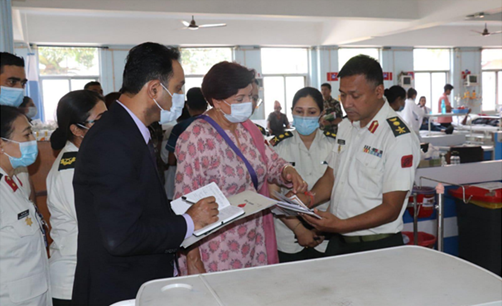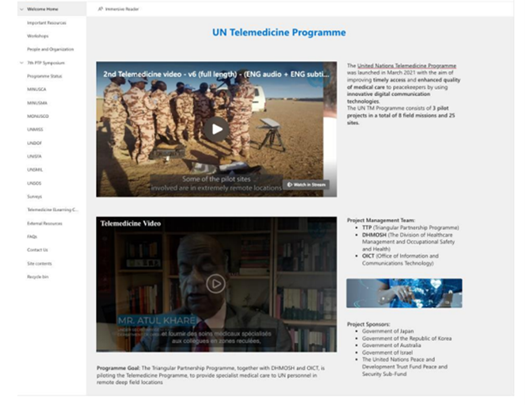Enhancement of Telemedicine capabilities for Peace Operations
Other partners: External Member State hospital, Shree Birendra Military Hospital, Kathmandu, Nepal.
Synopsis
Objectives
The project aims to improve the readiness of UN peace operations and medical care to mission personnel by establishing baseline telemedicine capabilities in four field operations (UNISFA, UNSMIL, UNSOS, and UNDOF), enabling clinical information sharing and facilitating multidisciplinary collaboration among specialists who provide medical care to mission personnel.
Components
The project’s support includes assisting UN Missions with setting up telemedicine ICT hardware and software, developing Standard Operating Procedures, guidelines, and legal frameworks for teleconsultation, procuring and installing telemedicine equipment, delivering training on telemedicine operation and maintenance, and establishing a secure telemedicine network between a Member State hospital and a UN mission hospital.
Main achievements
Intra-mission telemedicine capabilities, including information and communications technology solutions, were established in eight sites in UNSOS, UNDOF, UNSMIL and UNISFA.
Additionally, advanced remote medical support from an external Member State hospital (Shree Birendra Military Hospital, Kathmandu, Nepal) to UNSMIL and UNDOF was piloted.
Moreover, a one-stop digital resource centre, the Telemedicine Hub, was developed.
Implementation documents such as Standard Operating Procedures (SOPs), guidelines, training materials and other educational resources were made available for the continuity of telemedicine services, for all telemedicine users.
Furthermore, an online eLearning course on Telemedicine in UN field missions was designed, developed, and is now available at the United Nations System Staff College. A total of 72 participants were enrolled in the course, which is tailored to address specific medical and operational needs of the project as per the evolution in use cases and telemedicine solutions.
Lastly, five virtual training and capacity-building workshops were conducted. A telemedicine user experience survey was designed and distributed to users across the four pilot missions. 84% of participants reported that they are likely to use Telemedicine in the future because they participated in this pilot project.
Impact
The project improves access to quality healthcare for UN personnel by reducing unnecessary medical transports, evacuations, and referrals to tertiary care centers; increasing access to expert medical opinions from higher-level facilities to support mission-level clinicians; and providing specialized medical support and counseling for UN staff in locations without on-site psychiatric, psychological, or social work professionals.
 DHMOSH Deputy Director Dr. Adarsh Tiwathia leading the Member State hospital assessment for telemedicine at Shree Birendra Military hospital in Kathmandu, Nepal in June 2023
DHMOSH Deputy Director Dr. Adarsh Tiwathia leading the Member State hospital assessment for telemedicine at Shree Birendra Military hospital in Kathmandu, Nepal in June 2023
 The Welcome page of the Telemedicine Hub
The Welcome page of the Telemedicine Hub
